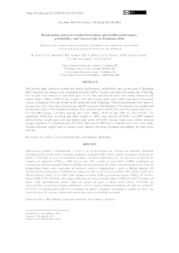Relationships between residual feed intake and feedlot performance, profitability, and carcass traits in Brahman cattle.
Relationships between residual feed intake and feedlot performance, profitability, and carcass traits in Brahman cattle.
Autoria: FAVERO, R.; MIZUBUTI, I. Y.; GOMES, R. da C.; RIBEIRO, E. L. A.; PEREIRA, E. S.; PRADO-CALIXTO, O. P. P.; MASSARO JÚNIOR, F. L.; SANTOS, A. P. S.
Resumo: The present study aimed to evaluate the feedlot performance, profitability and carcass traits of Brahman bulls classified according to the residual feed intake (RFI). Twenty-four bulls (19-month old, 370±34kg live weight) were housed in individual pens for 54 days and had the daily feed intake (observed dry matter intake, DMIobs; DMI % live weight, LW) and average daily gain (ADG) measured. Ultrasound carcass evaluations were performed at the initial and final weighings, when measurements were taken of Longissimus dorsi area, ratio, Longissimus and Biceps femoris fat thickness. The animals were ranked and divided into high (>+0.5 standard deviation; SD), medium (between ±0.5 SD from the mean), and low (<-0.5 SD) RFI groups. Low-RFI animals had lower DMIobs (P<0.10) and DMI % LW (P<0.05). No significant differences in initial and final weight or ADG were noticed (P>0.05). Low-RFI animals showed lower weight gain cost and higher daily profit (P<0.05). Carcass traits were similar between groups, regardless of evaluation date (P>0.05). Selection for RFI lead to animals with lower feed intake without affecting weight gain or carcass traits, thereby providing increased profitability for beef cattle farming.
Ano de publicação: 2018
Tipo de publicação: Artigo de periódico
Unidade: Embrapa Gado de Corte
Palavras-chave: Feed conversion ratio, Musculature
Observações
1 - Por padrão são exibidas publicações dos últimos 20 anos. Para encontrar publicações mais antigas, configure o filtro ano de publicação, colocando o ano a partir do qual você deseja encontrar publicações. O filtro está na coluna da esquerda na busca acima.
2 - Para ler algumas publicações da Embrapa (apenas as que estão em formato ePub), é necessário ter, no celular ou computador, um desses softwares gratuitos. Sistemas Android: Google Play Livros; IOS: iBooks; Windows e Linux: software Calibre.
Acesse outras publicações
Acesse a Base de Dados da Pesquisa Agropecuária (BDPA) para consultar o acervo completo das bibliotecas da Embrapa.

